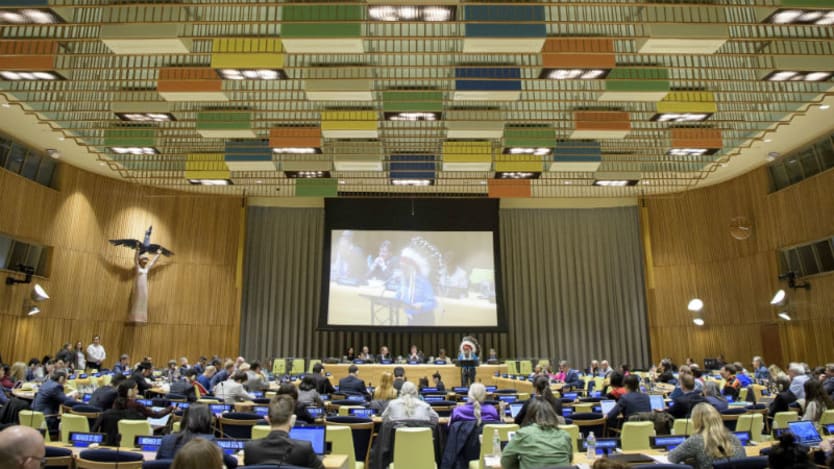
UNITED NATIONS — Greater accountability for funders of governments with poor human rights records is needed as attacks on indigenous communities and human rights activists increase, indigenous women human rights defenders warned Thursday at the United Nations.
Governments and multilateral organizations offering aid to countries with a record of violating indigenous peoples’ rights record bear a level of responsibility for the violence, one indigenous leader from Kenya said. She spoke alongside other female indigenous leaders from Kenya, Finland, and Bangladesh during the U.N.’s 17th Session of the Permanent Forum on Indigenous Issues, a gathering of more than 1,000 indigenous peoples that runs through April 27.
While indigenous peoples make up 5 percent of the global population, they comprise 15 percent of the world’s poorest people, according to U.N. figures.
Indigenous peoples push for permanent seat at UN
Indigenous leaders and representatives worldwide are convening at this year's United Nations Permanent Forum on Indigenous Issues, which runs through May 5. One issue they are lobbying for is regular access to the U.N. and a seat at the General Assembly.
For example, the annual U.N. forum offered an opportunity to ask governments to reconsider their support to the Kenya Forest Service, an agency of the Kenyan government, said Milka Chepkorir Huto, a human rights activist from Sengwer, Kenya. The ongoing battle between the Kenya Forest Service and the Sengwer people over land rights in western Kenya has recently attracted international attention.
The European Union recently weighed in on reports of a rash of evictions the Sengwer people experienced from the Embobut Forest, an area they consider their ancestral land. The EU suspended a water tower protection program in Kenya in January, following the eviction reports. There have been recent calls from activists for Finland to do the same.
Kenya’s environment ministry has reportedly said they were not aware of the recent evictions.
Pressuring Kenya Forest Service funders including Finland and Sweden could be a means to communicate more effectively with the Kenyan government, Huto suggested.
“We try to cut the link between them and international donors by telling them, ‘You have to see that your money is not doing what it is supposed to do.’ When they realize that, the government will be desperate enough to listen to us,” she told Devex.
Lack of law enforcement over protecting land rights for indigenous peoples is one issue driving this year’s forum at the U.N., Mariam Wallet Aboubakrine, a doctor from Timbuktu, Mali, and chair of the forum, told the General Assembly this week.
Criminalization — a current area of investigation for the U.N. special rapporteur on the rights of indigenous people — can manifest in various forms. Indigenous people only hold legal rights to 10 percent of the land they claim as theirs globally. Formal recognition of these land rights has slowed recently, according to the World Resources Institute. Cracking down on protests is another method that could make indigenous people vulnerable to arrest.
“We are seeing criminalization of human rights defenders, and we are all worried our government, as well as some other countries in Asia, have become more intolerant to indigenous peoples and their plight,” said Rani Yan Yan, an indigenous human rights campaigner and adviser to the Chakma Circle Chief in the Chittagong Hill Tracts region of Bangladesh.
“Criminalization is often the way the governments pursue to take this, as a way to oppress the indigenous peoples. We have seen the media repressed severely and civil space has decreased. We cannot make our voices heard,” Yan Yan continued during a U.N. media briefing.
Last year, 312 human rights defenders in 27 countries were killed, according to the Dublin-based nonprofit organization Front Line Defenders. This marks an increase from 2016, when 281 were murdered and shows a steady escalation from the 130 activists reported killed in 2014.
More than two-thirds of these activists were killed because they were defending land, environmental, and indigenous peoples’ rights. About 12 percent of the murder cases resulted in the arrest of suspects, according to Front Line Defenders.
Fourteen indigenous women were killed last year in the Chittagong Hill Tracts, according to Yan Yan. So far, there have been no arrests or convictions.
“We have this discourse of us versus others, non-indigenous versus indigenous, and indigenous peoples have been looked down upon — that we have come from a different country and don't belong. If any human rights violations happen in indigenous communities, it is difficult for us to mobilize non-indigenous persons because they share the same values the state does,” Yan Yan said in response to a Devex question.


